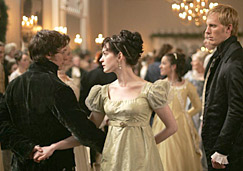Ellen and Jim Have a Blog, Too
We are two part-time academics. Ellen teaches in the English department and Jim in the IT program at George Mason University.


_Becoming Jane_: a dismaying mirror · 6 August 07
Dear Miss Vane,
I have already sent you Miss Schuster-Slatt’s reviews of Becoming Jane, movie and screenplay, and myself critiqued Jon Spence’s book upon which the invented story is based. Now I add my own review.
I sat through Julian Jarrold, Kevin Hood, and Robert Bernstein’s Becoming Jane yesterday afternoon. In brief, it’s a muddled mess even as a story, and not only enacts but dismayingly repeats gratuitiously the idea that a woman who does not marry or have children might as well have died at age 16, for her life has been barren, wasted. By the end of the movie when Austen is presented as a spinster, she is dressed up in a costume that is a cross between Victorian and 1940s spinster as imaged in maudlin magazines which stigmatize reading. As to what it has to say about Austen, it’s made-up drivel. A representation of Radcliffe is ludicrous, embarrassingly coy and dowdy. This is quite apart from the travesty of scholarship the “factual” history of the film is based on.
The plot-design has Pride and Prejudice in mind. Maggie Smith plays a Lady Gresham who enacts a bullying Lady Catherine de Bourgh role, except Lady Gresham is pressuring Jane (Anne Hathway) to marry her rich nephew, Mr Wiseley (Laurence Fox) who is presented as a cross between Mr Collins and the real Biggs-Wither in Austen’s life who did have money, asked her to marry him, and whom she almost married to help support widowed mother and sister. James Cromwell acquits himself well as Mr Austen (whose stance recalls that of Austen’s Mr Bennet). Julie Walters who played Mrs Austen was dressed and looked like Brenda Blethyn who played Mrs Bennet in the 2005 Universal P&P. There is a scene of Tom Lefroy (James McAvoy) and Jane Austen (Anne Hathaway) dancing which is meant to imitate the famous one of Darcy and Elizabeth locked in antagonistic courting and conversation:
The cinematography and feel of the movie (it’s anti-artifice and characters running about in fields under the trees) recalled the recent ITV 2007 Mansfield Park.
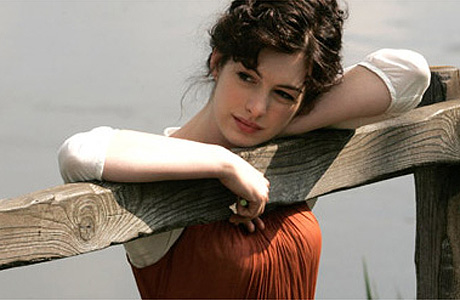
And Anne Hathaway is a good actress; she seemed to be made up to look like (and does resemble a little) Frances O’Connor who played Fanny Price as Jane Austen in Rozema’s 1999 Miramax Mansfield Park.
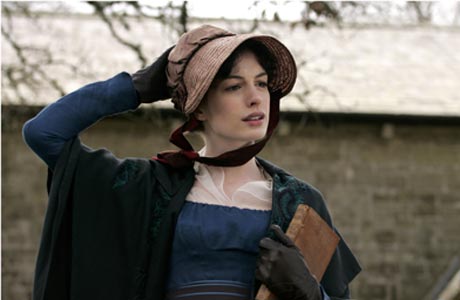
With a book
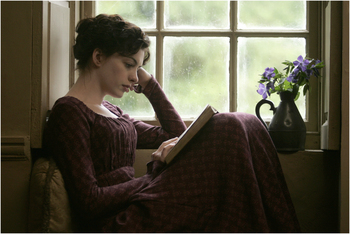
The archetypal window with flower arrangement
About the middle of the movie there are some moving scenes when Cassandra’s (Anne Maxwell Martin) fiancee dies, and just after Tom Lefroy (James McAvoy) decides not to marry Jane Austen, there is sequence where Hathaway crosses a beach and really begins to look like a presence who is maturing through a loss inflicted by an unjust and typically cruelly materialistic and prestige-, and money-driven local community, but this is ruined by a silly elopement sequence (a rehash of the Lydia Bennet story except of course our virtuous Jane does not have sex with Tom) where money and family win out. As opposed to Austen’s Elizabeth who laughed at Jane for saying she might not want to marry Mr Bingley lest she make enemies of his sisters and said Lady Catherine de Bourgh had no right to control the life choices of her nephew or herself, Bernstein, Jarrold, and Hood’s Jane makes her family members her controllers for life.
A sop is thrown to liberal or modern ideas in the continual appearance of the third brother, George (Philip Culhane), who Jane walks in the woods with and talks to through expert sign language. It’s also true that the film makes it clear that Austen admired Radcliffe as a predecessor. At least this is an improvement on Andrew Davies’s NA where we are to be titillated by Catherine Morland reading the sexy passages of Lewis’s Monk while Radcliffe is outright burned. Becoming Jane shows Jane reading Tom Jones under the influence of Tom Lefroy’s taste. We know nothing of Lefroy’s reading habits; it was Jane Austen who had already read Tom Jones and likened his clothes and fashion sense to Fielding’s Tom.
Interestingly despite the many added scenes of men boxing and Jane Austen playing rough cricket, James McAvoy represents a return to a male lead who looks somewhat feminine, vulnerable, sensitive:
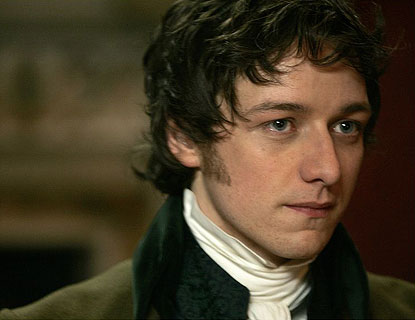
The auditorium was full, and there were many men there. Among the worst elements in this experience was the laughter at semi-sneering jokes which form a spill-over from TV in popular movies. The last scene is transparently meretricious. We are to believe that Jane Austen when in her forties is deeply moved to meet Tom Lefroy with one of his daughters when she discovers he named this daughter Jane, and that a huge crowd of people sit down to hear her read aloud one of the more sentimental passages (as it emerges in context) from Pride and Prejudice.
I said in my compendium review of WSC’s Romans in Britain and the Capitol Fringe Festival that this film is a profoundly dismaying film. It is. It show that feminism has gotten no where in popular culture, that the passion for reading (a deep pleasure and source of exhilaration and community) is cruelly stigmatized, and it also shows that the post-feminists are kidding themselves if they think the marriage and children are now being touted as a desperate refuge from the unjust life-destroying exploitative way women’s sexuality is repressed and used.
I can say that the stills of Hathaway occasionally bely the thrust of the movie and celebrating writing and reading women, women piano playing and women in solitude and friendship:
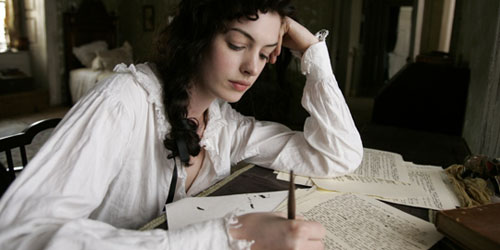
I just wish I had the still of Hathaway walking along a beach in the drizzling rain, all alone after Lefroy has deserted her.
Miss Sylvia Drake
--
Posted by: Ellen
* * *
Comment
- From Penny Klein:
“I doubt I will see Becoming Jane Austen. I have already heard bad things about it. I have the book but it is meant to be a biography to “apologise” for the timeline. The author thinks it is possible they could have met again and been the plot for P&P. I will read most if not all the review including the ones by ignorant reviewers, the ones that never read JA. Just for fun.
Anyway onto living life
Love,
Penny”
— Elinor Aug 6, 8:06am # - P.S. Though presented ludicrously the presentation of Radcliffe as an author deeply influential on Austen in Becoming Jane was accurate.
In her letters Austen isa strongly competitive writer and novelist and often critiques the authors (especially fellow novelists) she reads so intensely harshly. They are her rivals in her mind and she has nowhere else to erase them but in these letters. Pathetic in a way I think. One novelist she does consistently show respect for (though we have only a couple of remarks each for most of them) is Madame de Stael, and Delphine and Corinne are essential books for understanding Austen.
I take it she was too shy, uncomfortable to go into literary society. She was not used to it so she refused her family’s encouragement to for once really meet one of the authors, an equal she spent her inner life with.
The books to read for context for Austen’s are her contemporaries. They are not world-historical classicsor even necessarily the ones respected and read today. They are especially Austen’s women contemporaries in the novel, French as well as English; she read what we call minor plays and contemporary memoirs and books of letters (especially the travel type which informed—we get this from her circulating library and book club suscription) heavily too. She tells us more than once that she’s an avid, avid unashamed novel reader and the novels cited are closely contemporary ones.
E.M.
— Elinor Aug 7, 7:14am # - Writing offblog to Judy G, I thought I’d add a few more thoughts here:
Maybe movies “grow” on a person and I think I might like the film better a second time (Diana Birchalls did). The one fine sequence occurred just after Tom broke off with Jane and we see her beginning to shoulder a burden of existence in a sequence walking on a deserted beach in the rain. For the rest it’s in retrospect the film becomes interesting to think about.
The split second it was over I was out of that theatre—scooting out. There were moments I could barely sit there, but I think they were made much worse because of the audience laughter (not at but seemingly with the film). If only I could have seen it in a silent theatre. It's in retrospect that it becomes interesting to think about.
Increasingly too I begin to see that stills or the pictures themselves escape the director’s control or directors communicate another message through them. There is a lot of information coming out at the audience all at once from different sources. Why is Austen seen as a dark-haired wiry athletic type (Anne Hathaway made up to look like Francis O’Connor) I don't know.
And it’s an odd costume drama—for like the 2005 and 2007 films the costumes are not really accurate but seem some cross between dreams of 18th century clothes as first depicted in the 1967 Tom Jones and modern casual dress. It didn’t quite feel like a costume drama. Perhaps that’s because it was not based on a book, but then neither was Amazing Grace. I think the directors tried for a modern feel: that’s why the maudlin bun on Austen’s head (circa Betty Davis in the 1940s Now Voyager when she first appears looking like a plain spinster).
E.M.
— Elinor Aug 7, 11:59pm # - The film is probably most important in what it reveals about the way Austen as a product is used in popular media. Very hurtful for women. The image of Jane at the end is worth (albeit demoralizing) study.
It’s this, Maggie Smith’s frustrated Lady Gresham. Other very irritating portraits of women include the absurd bridling-coy way Eliza de Feuillide (Lucy Cohu) is acted.
The only heartening thought is the reality of some women’s lives is quite different. So we are back to trying to get people to tell the real history of women.
E.M.
— Elinor Aug 8, 7:53am # - "Dear Ellen,
I know you’re still away, but before I forget, I want to tell you that I thought your review of Becoming Jane was 1000% right – I could have echoed every word. My thoughts exactly. I was shouting “Yes!” the whole time I read it.
Diana"
— Elinor Aug 17, 9:07pm # - I’d like to comment on the “sources” of Becoming Jane. For the plot-outline about a man educating a woman and a love story growing out of this there’s no need to find a specific literary source: according to Stanley Cavell’s classic studies of characteristic plot-designs of Hollywood and other comedies, we repeatedly find a story of a women who choses a man who provides her with an education in which she achieves an identity through him. The book is Pursuits of Happiness; in Contesting Tears, Cavell finds versions of this story in melodramas too.
E.M.
— Elinor Aug 17, 11:44pm #
commenting closed for this article

